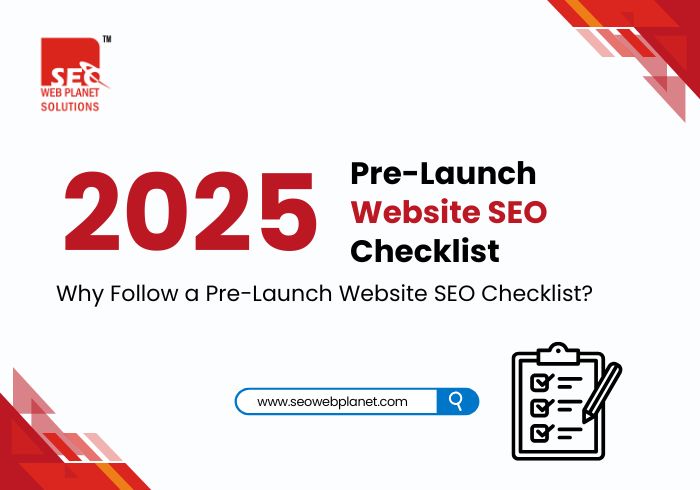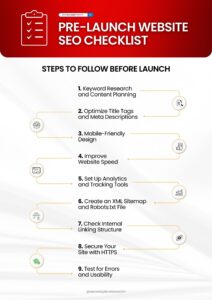Pre-Launch Website SEO Checklist (2025 Edition)

Launching a new website is an exciting moment. However, before you make your site live, there’s one important step you should never skip: preparing your Pre-Launch Website SEO Checklist. Without proper optimization in place, your site may struggle to appear in search results, leading to lost visibility and fewer visitors.
In this guide, we’ll cover everything you need to know to ensure your website is optimized before launch. These easy-to-follow steps will improve your chances of ranking higher on Google and delivering a smooth user experience from day one.
Why a Pre-Launch SEO Checklist Matters
Before your site goes live, search engines need clear signals to understand your content, structure, and purpose. Skipping these steps often results in issues like slow indexing, duplicate pages, or poor usability. By working through a checklist before launch, you set up your website for success right from the start.
Steps to Follow Before Launch

- Keyword Research and Content Planning
- Identify your primary and secondary keywords.
- Write high-quality, simple, and engaging content around them.
- Ensure every page has a clear focus topic.
- Good keyword planning helps your site connect with the right audience and improves visibility in search results.
- Optimize Title Tags and Meta Descriptions
- Create unique title tags for every page.
- Keep titles under 60 characters and meta descriptions under 160 characters.
- Include keywords naturally without stuffing.
- These small details increase your click-through rate when users see your site in search results.
- Mobile-Friendly Design
- Test your website on multiple devices.
- Use responsive layouts that adjust to different screen sizes.
- Make sure buttons and menus are easy to use on mobile.
- Google prioritizes mobile-first indexing, so this step is critical.
- Improve Website Speed
- Compress images without losing quality.
- Use caching and a Content Delivery Network (CDN).
- Minimize heavy scripts that slow down loading time.
- A fast website improves both rankings and user experience.
- Set Up Analytics and Tracking Tools
- Install Google Analytics and Google Search Console.
- Track visitor behavior, top-performing pages, and conversion rates.
- Monitor search engine performance from day one.
- These insights will help you make informed decisions after launch.
- Create an XML Sitemap and Robots.txt File
- Submit an XML sitemap to Google Search Console.
- Use a robots.txt file to guide search engine crawlers.
- Ensure no important pages are accidentally blocked.
- This helps search engines discover and index your pages quickly.
- Check Internal Linking Structure
- Link related pages together.
- Avoid broken links or redirect loops.
- Use descriptive anchor text for better understanding.
- Internal links guide users and help search engines crawl your site more efficiently.
- Secure Your Site with HTTPS
- Install an SSL certificate.
- Make sure your site displays “https://” in the browser.
- Update all internal links to the secure version.
- Security builds trust and is also a ranking factor in Google.
- Test for Errors and Usability
- Double-check spelling and grammar.
- Ensure all forms, buttons, and navigation work properly.
- Test your site speed, links, and mobile usability again before launch.
- A bug-free website provides a better first impression to visitors.
Final Thoughts
Preparing your site for search engines is not just a technical task, it’s the foundation of your online success. By following this Pre-Launch Website SEO Checklist, you ensure that your new website starts on the right foot in 2025. It helps improve visibility, creates a positive user experience, and positions your business for long-term growth.
Remember, SEO is a continuous journey. Once your website is live, continue to monitor, update content, and adapt to new trends. The digital world evolves quickly, and so should your SEO strategy.
Frequently Asked Questions (FAQs)
- What is a Pre-Launch Website SEO Checklist?
It’s a step-by-step process to optimize your site before launch for better Google ranking.
- Why is mobile-friendly design important?
A mobile-friendly website improves user experience and boosts visibility in search results.
- How does site speed affect SEO?
Fast site speed reduces bounce rates and helps improve overall SEO performance.
- What tools should I set up before launch?
Install Google Analytics and Search Console to track performance and indexing.
- When should I start SEO for my website?
SEO should begin during the planning stage to align the structure, content, and SEO checklist goals.



